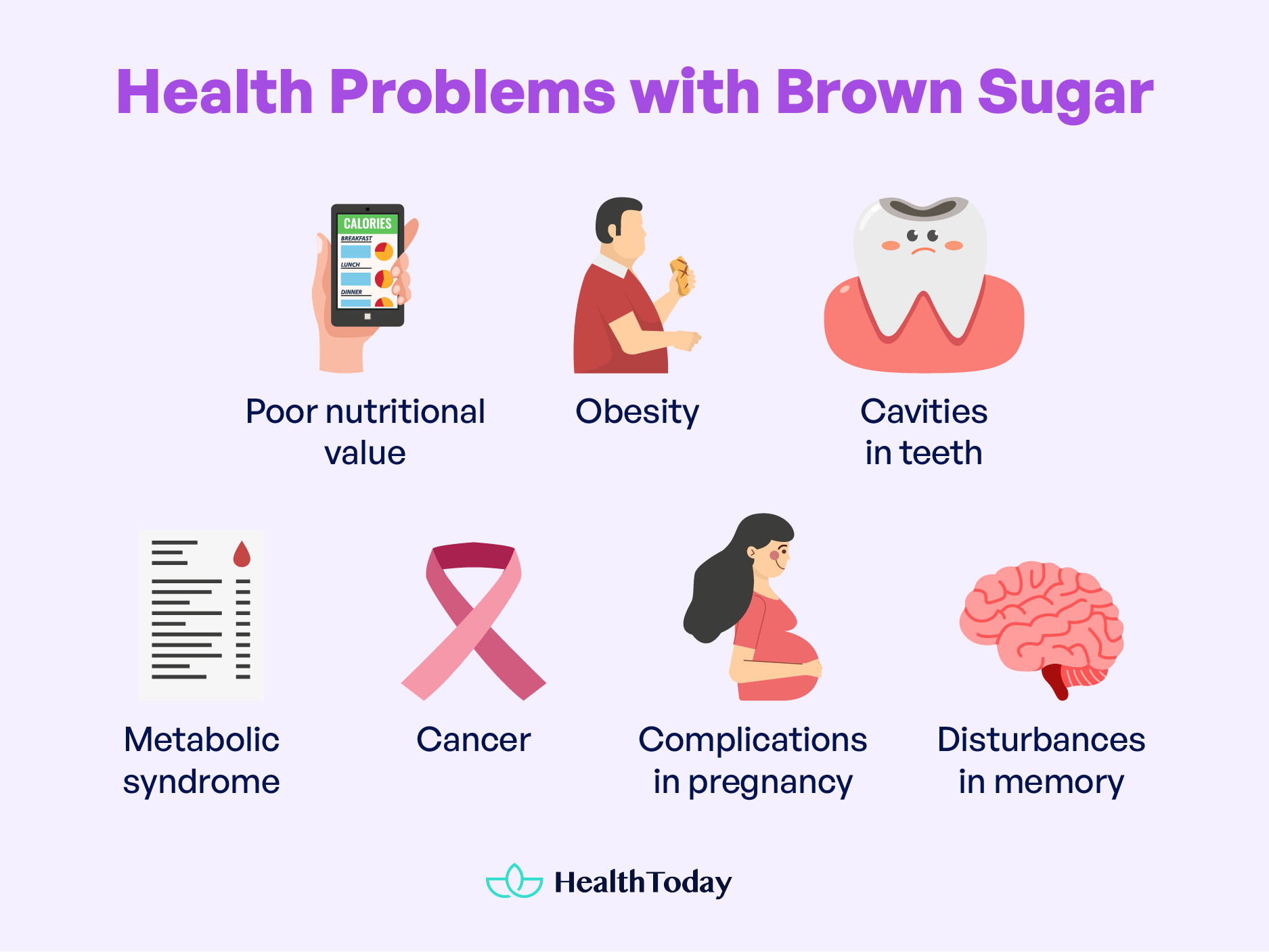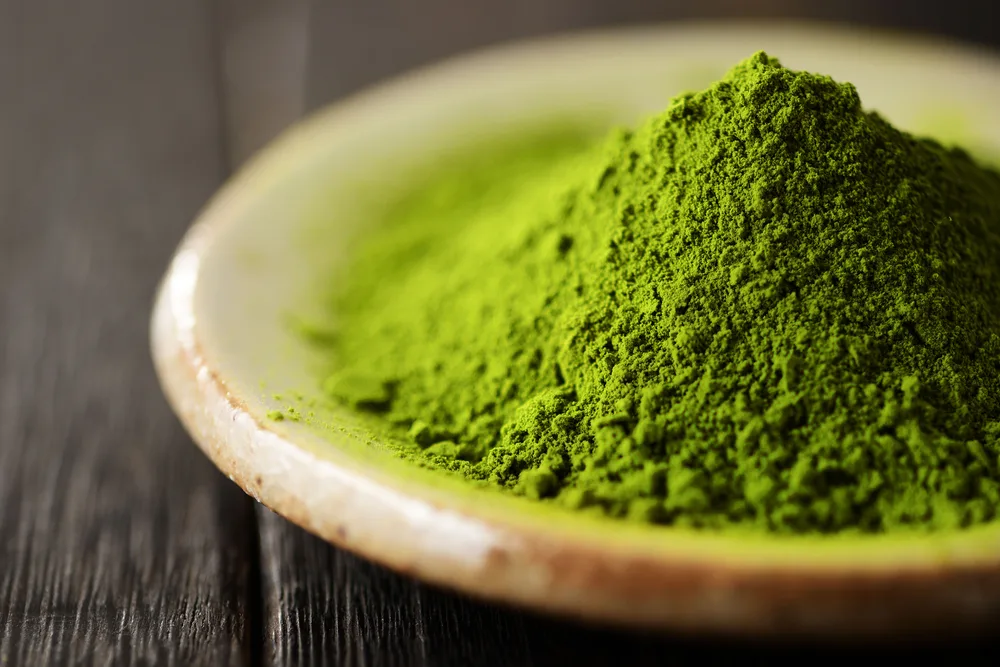Table of Contents
“Is brown sugar healthy?” and “Is it healthier than white sugar?”. These two questions seem tricky, but this article will give you a clear answer and insights into the various effects of brown sugar on our health, including diseases associated with it and how healthy it is compared with white sugar.
We also suggest some best alternatives, which have various health benefits and essential nutrients to incorporate into your diet.
Is Brown Sugar Bad For You?
Brown sugar is a conventional sweetening agent made by sugarcane processing, creating its unique flavor (1).
Sugar is part of our diet. Though it gives us a lot of calories, there are multiple harms associated with sugar, especially added or artificial sugars (2, 3). Brown sugar is a sugar added to the diet and has multiple health concerns discussed below.
Nutrition facts about brown sugar
In 100 grams of brown sugar, there are 380 calories, 98 grams of carbohydrates, and almost no dietary fiber, fat, or protein (4).

Brown sugar provides a lot of calories but negligible nutritional essentials in your diet. Thus, when you consume it in excess, it does more harm than good. Brown sugar causes some serious effects on the metabolic system. It triggers metabolic diseases, which include type 2 diabetes and fatty liver in predisposed individuals. It also increases the risk of cardiovascular disease, i.e., heart problems.
Brown sugar contains a component known as sucrose, which contains fructose. Fructose is associated with weight gain, the cause of many medical conditions (1, 5).
Brown sugar causes health problems via direct and indirect mechanisms. Directly, the fructose in brown sugar causes dysfunction in fat and carbohydrate metabolism, while indirectly, brown sugar calories are converted to fat and, ultimately, lead to obesity (5).
Some key health problems with brown sugar are as follows (5, 6, 7, 13):
- Poor nutritional value: While you consume these added sugars, you take in a lot of calories that give you energy, and you do not feel the need to add some important dietary essential elements such as vitamins and minerals. These sugars satisfy your cravings, but the result is that you are left with fewer nutrients than what you started. Since sugar lacks nutrients, it robs your body’s stores of nutrients, which are necessary to metabolize it.
- Obesity: Obesity or high Body Mass Index (BMI) is the root cause of many health issues in the general population. Added sugar in the form of brown sugar increases the caloric intake and the conversion of those extra calories to fats. The fats deposit in vessels causing heart problems, cancers, hypertension, acid reflux disease, and many other illnesses. This excessive sugar consumption is also linked to depression and an overall poor quality of health.
- Cavities in teeth: Added sugars are notorious for creating cavities and tooth decay. The sugars help bacteria grow on tooth surfaces and create plaque deposition and biofilms, which erode both the tooth surfaces and the gums.
- Metabolic syndrome: Metabolic syndrome is also known as metabolic disease. Metabolic diseases include type 2 diabetes and cardiovascular (CV) diseases. CV diseases are heart issues that occur from fat building up inside blood vessels and blockage of arteries to the heart. Another metabolic disease is non-alcoholic fatty liver disease, which can lead to chronic liver disease.
- Cancer: Refined and added sugars like brown sugar or other sugars containing sucrose or fructose have been found to cause inflammation and alter glucose and fat metabolic pathways in the body. This makes it easier for the growth of cells leading to tumor formation. Some common cancers from these sugars are prostate, gastrointestinal, colon, and hepatic (liver). (21)
- Complications in pregnancy: Pregnant women who consume large amounts of added sugars can develop gestational diabetes mellitus (GDM). This can lead to various complications for both the baby and the mother.
- Disturbances in memory: Consumption of sugars also leads to poor performance in the cognitive domain—mental processing, memory, and verbal fluency are negatively affected.
So does all this indicate we need to cut down on brown sugar consumption, along with other sugars in our diet? Or is brown sugar healthy? The answer is simply No to both. You don’t need to eliminate completely sugars in your diet, but brown sugar has no health benefits.
Natural sugars can fulfill our bodily requirements for sugars, and brown sugars should be cut off as we do not need any added sugars in our diet (8).
However, a study found that brown sugar has its minimally refined brown sugar type. This brown sugar does not go through as much processing as the standard brown sugar.
Minimal refining helps sugar retain some healthier properties, such as antioxidant qualities, which help fight the damage caused by oxidative reactions in our bodies. It also contains a mineral named selenium, which mimics insulin and helps improve insulin functions in our body. Insulin is the key hormone involved in diabetes, and these actions can benefit people with diabetes.
Although there needs to be further research in this area, there is a small saving grace to minimally processed brown sugar. However, the damage that brown sugar does to the body should be emphasized more (9).
Calories in a teaspoon of brown sugar
One teaspoon of brown sugar is 4.6 grams. It gives you 17 calories per serving. It contains 4.5 grams of carbohydrates, along with insignificant contributions from minerals as well as zero fat or protein content (10).
Brown sugar is unhealthy not only for adults who already have many health concerns due to age and lifelong exposure to environmental hazards, but it is also a threat to children and teenagers.
The American Heart Association (AHA) suggests a consumption of less than 6 teaspoons of these sugars per day in teenagers and even children (11).
For children under two years old, the AHA guidelines suggest zero artificial sugars in the diet. Generally, it is recommended that sugars make up less than 10% of an adult’s diet. On average, a person consumes almost 2,000 calories in a day. Less than 10% will mean less than 200 calories per day (6).
According to a claim by the National Cancer Institute, an adult man usually consumes about 24 teaspoons of processed sugars per day, which totals about 384 calories. There is no daily limit set for the total sugars, including added and natural sugars. However, there is a borderline level recommended by the AHA for added sugars, which is less than 100 calories (almost 6 teaspoons) for women and less than 150 calories (9 teaspoons) for men. A 12-ounce soda usually contains 9 to 12 teaspoons of sugar (3).
Recognizing different names of sugars
It is very important to recognize added sugars in order to cut them out of your diet. Some common names for sugar on food labels include (3):
- Corn syrup
- Brown sugar
- Corn sweetener
- High fructose corn syrup
- Malt sugar
- Molasses
- Sugar molecules that end in “ose” such as fructose or sucrose.
It is also important to know that the food industry may disguise its sugar content. They may do this by stating the amount of sugar per serving, but the consumer doesn’t realize he eats the whole box instead of a serving size (3).
Different ways to subtract added sugars from the diet
It’s difficult to completely cut these sugars out of our diet as they are often hidden in what we consume daily, including in foods not sweet, such as soup, tomato sauces, and cured meat (12).
Below are some replacements you can make to limit your added sugar consumption (6):
- For breakfast, choose cereals carefully, reading labels for the one with the lowest sugar content.
- Instead of pies, ice creams, and flavored desserts, select fresh fruits to help satisfy sugar cravings.
- Replace beverages and energy drinks with water, herb teas, and freshly squeezed juices to stay hydrated.
- Buy canned fruits packed in water instead of syrups.
Brown sugar is an added sugar which is made from the sugarcane after extensive refining. All added sugars, including brown sugar, provide no nutritional value to our diet; instead, they can lead to the development of type 2 diabetes, obesity, poor oral health, cancer, heart problems, memory problems, and others. Generally, it is thought that brown sugar is better than white sugar, although this is not true. The American Heart Association sets the daily limit for added sugars to less than 100 calories for women and less than 150 calories for men. One hundred grams of brown sugar provides 380 calories.
Which sugar is healthier: white or brown?
It has been long thought that brown sugar is healthier than white sugar though studies are scarce to support this claim. The bottom line is that neither is healthier but equally problematic to health (13).
Does this mean no type of sugar is healthy for our bodies?
This does not mean you should never eat anything sweet. Nature has always given us options without causing negative consequences to our health.
Natural sugars found in foods close to their original form are healthier. They contain essential vitamins and minerals and also satisfy sweet cravings. They give us calories which create energy and also add nutritional value to our diet.
You can find natural sugars in foods like fruits, vegetables, dairy products like milk, and whole grains. Consumption of natural sugars in the form of fruits or vegetables also helps to lower the risk of chronic diseases such as cancers, diabetes, or heart issues (3).
Is raw sugar better than white sugar?
Raw sugar is partially refined sugar, while white sugar is purely refined sugar. The process of refining removes the essential nutrients present in raw form. So yes, raw sugar in any way is better than refined sugar. It retains some natural nutritional components not present in white sugar as it goes through intensive processing that removes its fiber and nutrients completely, leaving only calories without essentials (9, 14). However, the question is whether the nutrients left in raw sugar are high enough to make any difference in our health.
Best sugar alternatives
The best sugars are natural sugars in natural foods; natural sugars retain natural vitamins and minerals.
Let’s discuss the example of an orange; if you eat it, it gives you all the vitamins, minerals, and fiber. But if you drink orange juice, even when no added sugars or syrups are used, it will dissolve the fibers and some essentials of this fruit. This example is mentioned to discuss the importance of natural foods as the best sugar alternatives (15).
Best foods with natural sugars (13):
- Honey
- Date palm
- Jaggery
- Sugarcane
- Sorghum
- Grape sugar
Essentials provided by these natural sweeteners (13):
- Vitamins
- Minerals
- Phytochemicals
- Antioxidants
The benefits of natural sugars (13, 16):
- Healthy Immune system
- Good gut health
- Lowers cholesterol
- Prevention of type 2 diabetes and heart diseases
- Reduce weight gain
- Detoxification
- Overall wellbeing
Is brown sugar bad for cholesterol?
Brown sugar is an added sugar to foods that increases bad cholesterol called LDL-cholesterol. It decreases good cholesterol in our body, called HDL-cholesterol. It also increases triglyceride levels, which leads to metabolic disease. This impacts our CV system negatively and potentially causes cardiovascular problems (17, 18).
How many calories are in 14 cups of brown sugar?
Fourteen cups of unpacked brown sugar, which is 2,030 grams of brown sugar, contains 7,714 calories, according to the U.S. Department of Agriculture (19).
What is the best sugar to consume?
Natural sugars are the best sugars to consume. They are found in various foods, including vegetables, dairy products, fruits, and whole grains. Some of the natural sweeteners that one can use are honey, sorghum, date palm, jaggery, and grape sugar. These natural sugars satisfy sugar cravings and prevent multiple health conditions associated with the added sugars (13). However, they should not be the focus of one’s diet.
Can you eat brown sugar every day?
Brown sugar is an added sugar that poses many health concerns and offers nothing except a lot of calories – 380 calories for 100 grams. There is no advantage to consuming it daily. There is a set limit by the American Heart Association regarding the consumption of sugars: less than 100 calories (6 teaspoons) for women and less than 150 calories (9 teaspoons) for men (3). To get an idea of how to limit your intake, you can calculate your daily calories and decide how much you want to consume.
Which sugar is the most unhealthy?
Added sugars or highly refined sugars are the most unhealthy sugars. There is no need to cut natural sugars, ones from natural foods, from your diet, but any sugars that have undergone excessive refining should be eliminated. This means all added sugars and artificial sweeteners (20), which lead to many health conditions. They should be replaced with natural sweeteners and foods enriched with natural sugars should be avoided (13).
Summary
To fulfill our tastes for sugar, added sugars should be replaced with natural sweeteners, including honey, date palm, grape sugar, and natural foods containing sugars such as different fruits, vegetables, and milk. Natural sugars not only provide us with enough calories, but they also help to prevent some diseases and improve overall well-being.

















Comments
0